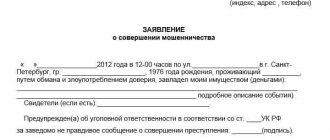In this article you will find instructions on how to correctly write a statement of claim for insult to honor and dignity of a person and where to file it, given that this is not a criminal offense and the police cannot deal with this issue. Read more about the article of the law of the Russian Federation on insulting a person (what can be considered an insult, what punishment is provided for this, what is the procedure for protecting citizens from insults that is currently in effect) here.
What is libel: legal framework
The concept of slander is spelled out in Article 128 of the Criminal Code of the Russian Federation. Slander is the dissemination by any means of information, knowingly false, that discredits the honor and dignity of another person, and undermines his reputation. Deliberately false information is a lie, and the one who disseminates this information initially knows that it is false.
The law establishes whether it is possible to write a statement for libel and under what conditions this is done:
- a slanderer aged 16 years or older is brought to justice;
- the article for libel is applicable only to individuals;
- When a slanderer deliberately slanders, he knows that he is spreading lies about another person, and does this with the aim of harming him (his reputation).
The culprit will be prosecuted for libel if he spread it in one of the following ways:
- on radio or television;
- published in the media or on the Internet;
- shown in a TV show and other sources;
- told at least one person;
- slander is reflected in public reports, characteristics, statements that are addressed to an official or a group of people.
These conditions are classified as aggravating circumstances:
- libel in public expression (mass media, reports, speeches, literary works);
- the victim was reported as having committed a criminal offense (grave, especially grave, sexual in nature);
- use of official position to spread slander;
- if the victim was spoken of as a spreader of a dangerous disease that threatens others.
Who can you file a complaint against with the prosecutor's office?
Anyone can file a complaint with the prosecutor's office, the main thing is that there are grounds for this. The main reason is violation of the law . If the complaint contains information about a violation of current legislation, the prosecutor's office is obliged to consider it. That is why when drawing up a document it is so important to be precise - to indicate specific information.
For convenience, we can highlight several of the most popular types of complaints that are written to the prosecutor’s office:
- For persons who manage commercial and non-commercial enterprises, public organizations, etc.
- On bailiffs (their actions or inactions) as well as other officials (tax inspector, city/district administration employees, etc.).
- On employers who believe that they can not comply with labor legislation (not pay wages, illegally fire).
- Developers who fail to comply with the terms of the DDU, do not comply with the requirements of the DDU, and do not respond to complaints.
- On the management company and resource supply enterprises for not fulfilling their duties.
- For sellers, manufacturers, people who provide paid services. If they violate consumer rights.
But there are restrictions - the prosecutor’s office does not work with individuals. If an individual violates the law, depending on the nature of the offense, you need to contact other law enforcement agencies. But if these bodies are inactive, then you can go to the prosecutor’s office.
How to prove libel
Defamation is a crime for which the law provides punishment. To prosecute the offender for slander, you will have to prove that the information expressed is false, and the slanderer has a motive for committing a crime (bad relationships, envy, rivalry, personal or career competition).
Before filing a claim for libel, evidence is collected. If the person who slandered you is acquitted, he will be able to file a claim for compensation for moral damage.
If there are witnesses that a person has been slandered, they testify in court under oath. If there are no witnesses, the victim independently records information discrediting him. For this use:
- recordings from surveillance cameras;
- voice recorders, mobile phones;
- clippings from printed publications, printouts and links to sites where defamatory materials are posted.
If the slanderer has a clear motive, police officers may well dispense with the involvement of witnesses, relying on the work of their own experts to solve the crime.
Collecting information
The legislation assumes the possibility of protecting citizens who have been subjected to unfounded attacks, because such violations provide for criminal liability.
A key step in preparing a formal complaint is evidence of defamation.
Unsubstantiated statements in the event of a trial end in losing the case.
In the case of collecting evidence, it is appropriate to find the motive for which the defendant disseminates false information.
Here, some of the likely options are personal hostility, a desire for career growth, or an attempt to “get rid of” an unwanted opponent.
However, the ignorance of the spreader of lies about the untruthfulness of such information automatically works in favor of this person.
Among the evidence, an important criterion is the testimony of eyewitnesses who heard gossip and are ready to refute such rumors.
However, finding like-minded people in such cases is not always possible. Let's figure out how to prove libel if there are no witnesses who are ready to speak in the courtroom. Here, means of recording information come to the aid of the injured person. If a citizen has been slandered by the media, a corresponding article or video with attribution must be attached.
It is appropriate to record the spread of false information in the workplace on a voice recorder or camera. In the case of virtual attacks on the Internet, it is advisable for the victim to take screenshots of the recordings and record the address of the site on which the unfair accusations “surfaced”. A particular difficulty in such cases becomes proof of the connection of a specific person to the information presented.
Where to apply
There are two types of liability for libel: criminal and civil. Where to file a statement of defamation for the victim depends on which method of defense is chosen:
- to the police;
- to court.
To the police
The police are considering cases of “simple” and “qualified” libel.
“Simple” slander includes slander without aggravating circumstances. The police will prosecute the slanderer under Part 1 of Art. 128.1 of the Criminal Code of the Russian Federation in the following cases:
- if the slander is directed at a person who is unable to defend his rights due to a dependent or helpless state (minors, the elderly, people with mental or physical disabilities);
- if the slanderer is unknown.
After reporting such slander to the police, officers conduct an investigation, initiate a criminal case, or refuse for lack of evidence of a crime.
Police and prosecutors are pursuing criminal charges for qualified libel. Parts 2-5 of Article 128.1 of the Criminal Code of the Russian Federation indicate aggravating circumstances when libel is recognized as “qualified”:
- slander in a speech, in a public work, demonstrated in the media;
- when the victim was accused of a serious, especially serious act;
- slander using official position;
- slander indicating that the victim is sick with a disease dangerous to others;
- slander indicating that the victim is involved in a crime of a sexual nature.
To court
The police transfer the materials to the court after conducting a pre-investigation check. If during the investigation a slanderer is identified, police officers conduct an inquiry, after which they transfer the materials to the magistrate or district court.
The court considers cases when:
- the offender is known;
- “simple” slander, without aggravating circumstances;
- the applicant is able to defend his rights himself;
- The application complies with the provisions of Article 318 of the Code of Criminal Procedure of the Russian Federation.
Contents of the appeal
In order to correctly write an appeal to the prosecutor’s office under Art. 5.61 of the Code of Administrative Offenses of the Russian Federation, you need to analyze what evidence and what facts you can provide, and also whether this data is sufficient to bring the offender to justice.
So, recommendations for compilation:
- Please provide your details correctly – full name, place of residence, phone number, age. This is necessary so that, if necessary, the assistant prosecutor appointed as the responsible executor for your material will contact you. In addition, the prosecutor's office has an Instruction on the procedure for receiving complaints, according to which, if there is no return address in a written appeal, the prosecutor may not verify the facts stated in it.
- Do not limit yourself to mentioning only the fact of the insult: the more detailed the events are described, the faster a decision will be made.
- All relevant evidence must be attached to the documents: they can be audio recordings, explanations of eyewitnesses, data from outdoor video surveillance cameras, letters of offensive content, etc. If you know the personal information of the person who insulted you, be sure to report this in the application, since the prosecutor may instruct the local police officer to interview him, as well as other citizens, on the circumstances you specified.
- Let us remind you that you can submit your appeal online to the prosecutor’s office of the region where you live. The requirements for formatting an email are the same as for a regular letter.
- State your reasons clearly. If the text is considered meaningless and incomprehensible, the prosecutor has the right to return the message back to the addressee without consideration.
- Correctly indicate the address of the place where the insult was committed - the prosecutor will check whether the territorial responsibility of this prosecutor’s office to consider your appeal. If it turns out that the incident occurred in another area, everything will be sent to the appropriate prosecutor's office.
Application consideration period
If an application is filed with the police, a decision on the application is made within three days. If the circumstances of the case are complex, the period is increased to 10 or 30 days. The statute of limitations applies to minor crimes. If the victim was slandered more than 2 years ago, he will not suffer any punishment.
If the case is filed in court, 7 days after registration of the application, the process is started (the alleged criminal is summoned to court, acquainted with the case, find out who else to call and hear as defense witnesses). There is no statute of limitations for cases brought to court. An exception is cases regarding information disseminated in the media (such cases have a statute of limitations of one year from the date of publication).
Collective complaint to the prosecutor's office
Before writing an application to the prosecutor's office, you should take into account that the correct document can be not only individual, but also collective. Drawing up a collective complaint is not much different from an individual document. The difference is that one person acts as an applicant, and if a collective one is written, there may be several applicants.
Typically, such complaint formats are drawn up if several people were affected or if the decision to write a complaint was made at meetings, rallies, etc. Several applicants can sign a collectively written application. So a collective complaint has only a few differences - it is drawn up by more than two people and several people can sign it.
Punishment for libel
The degree of punishment for libel depends on the severity of the crime. The law stipulates what will happen for a statement for slander to the police (what punishment the slanderer faces):
- “Simple” slander without aggravating circumstances is punishable by compulsory labor or a fine; the defendant will have a criminal record on his record.
- “Qualified” slander, with aggravating circumstances, when disseminated through the media, is fined up to a million rubles and compulsory labor for up to 240 hours.
- Defamation using official position is punishable by a fine of 2 million rubles.
- For lying about committing a serious, especially serious crime or a crime of a sexual nature, the defendant pays a fine of up to 5 million rubles.
- For lying about the presence of a dangerous disease, the slanderer will be fined 3 million rubles.
It is important to understand that the fine imposed by the court is paid to the state, not the victim. If the victim believes that he needs compensation for causing moral damage, he indicates this in the statement of claim.
About the author of the article
Anastasia Fedorchenko I value my time and nerves. Therefore, I am studying ways to protect them in any situation. I share my best finds with you.
Rejection of the request
If the claim is drawn up with errors, the court has the right to reject such an appeal
Considering that criminal proceedings involve serious proceedings, courts have the right to refuse to consider illiterately drawn up claims.
The second probable reason for rejection here is the insufficient evidence base collected by the plaintiff.
If the applicant does not provide specific evidence of the defendant's guilt, the court will refuse to proceed.
To minimize this outcome, it is advisable to use the legal services of practicing lawyers.
These people will competently fill out the necessary papers and collect evidence that directly indicates the defendant’s involvement.
But “savings” in such matters threatens to result in wasted time and nerves. Let us remind you that groundless accusations do not become a reason to admit that the plaintiff is right.
Making accusations
Unfounded accusations of libel are grounds for filing a counterclaim
Now let's look at the problem from a different angle and figure out how to act for people who are unreasonably making slander claims.
The law allows for filing a counterclaim in such circumstances..
Here, both cases are combined, and the judge objectively examines the materials presented to establish the true course of events.
An important addition to the counterclaim is a rebuttal.
In this paper, the defendant indicates the circumstances of the case and declares his own innocence.
Here, too, it is appropriate to enlist the support of a lawyer who will find witnesses and competently prepare the necessary documentation for the court.
Attention ! Strong evidence of the defendant’s innocence becomes a guarantee of a won case.
In addition, if during the proceedings the accused person manages to prove that the information disseminated about the plaintiff is true, the court takes the side of the defendant. Another legislative nuance is intent and motive.
In situations where the slanderer proves that he had no idea that the information was untrue and spread rumors without malicious intent, the court acquits such people.








